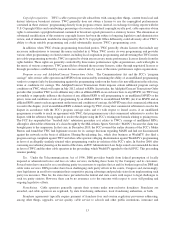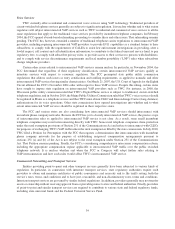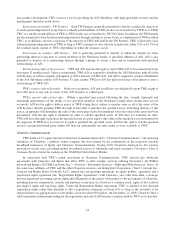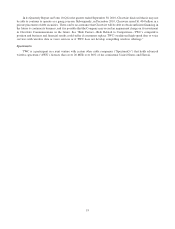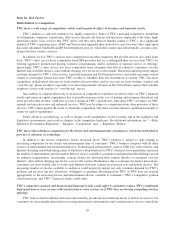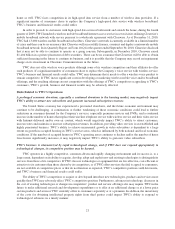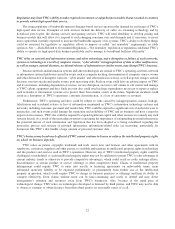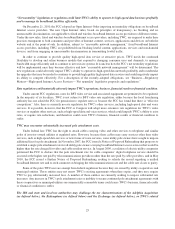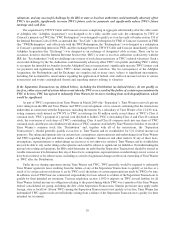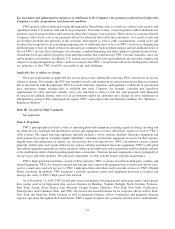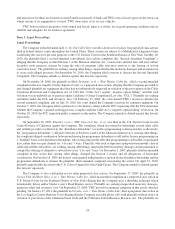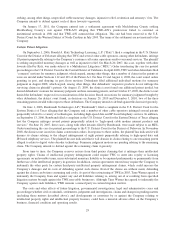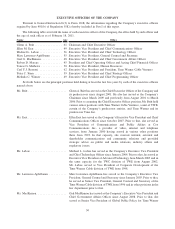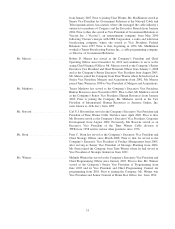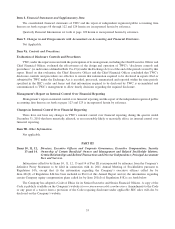Time Warner Cable 2010 Annual Report Download - page 35
Download and view the complete annual report
Please find page 35 of the 2010 Time Warner Cable annual report below. You can navigate through the pages in the report by either clicking on the pages listed below, or by using the keyword search tool below to find specific information within the annual report.TWC is party to agreements with Time Warner and an affiliate of Time Warner governing the use of “Time Warner
Cable” and “Road Runner” that may be terminated if TWC fails to perform its obligations under those agreements or if
TWC undergoes a specified change of control.
TWC licenses “Time Warner Cable” and “Road Runner” from Time Warner Inc. (“Time Warner”) and an affiliate of
Time Warner, respectively. These license agreements may be terminated by Time Warner or its affiliate if TWC commits a
significant breach of its obligations under such agreements, undergoes a specified change of control, or materially fails to
maintain the quality standards established for the use of these trademarks and the products and services related to these
trademarks.
If Time Warner or its affiliate terminates these brand name license agreements, TWC would lose the goodwill
associated with its brand names and be forced to develop new brand names, which would likely require substantial
expenditures, and TWC’s business, financial results or financial condition could be materially adversely affected.
The accounting treatment of goodwill and other identified intangibles could result in future asset impairments, which
would be recorded as operating losses.
Authoritative guidance issued by the Financial Accounting Standards Board (“FASB”) requires that goodwill,
including the goodwill included in the carrying value of investments accounted for using the equity method of accounting,
and other intangible assets deemed to have indefinite useful lives, such as cable franchise rights, cease to be amortized.
The guidance requires that goodwill and certain intangible assets be tested annually for impairment or earlier upon the
occurrence of certain events or substantive changes in circumstances. If TWC finds that the carrying value of goodwill or a
certain intangible asset exceeds its estimated fair value, it will reduce the carrying value of the goodwill or intangible asset
to the estimated fair value, and TWC will recognize an impairment. Any such impairment is required to be recorded as a
noncash operating loss.
TWC’s 2010 annual impairment analysis, which was performed as of July 1, 2010, did not result in any goodwill or
cable franchise rights impairment charges. However, it is possible that impairment charges may be recorded in the future
to reflect potential declines in fair value. See “Management’s Discussion and Analysis of Results of Operations and
Financial Condition—Critical Accounting Policies and Estimates—Asset Impairments—Indefinite-lived Intangible
Assets and Goodwill” and “—Long-lived Assets.”
TWC has incurred substantial debt, which may limit its flexibility and prevent it from taking advantage of business
opportunities.
As of December 31, 2010, TWC had $20.374 billion of net debt and mandatorily redeemable preferred equity. This
level of indebtedness may limit TWC’s ability to respond to market conditions, provide for capital investment needs or
take advantage of business opportunities.
Risks Related to Dependence on Third Parties
Increases in programming and retransmission costs or the inability to obtain popular programming could adversely
affect TWC’s operations, business or financial results.
Video programming costs represent a major component of TWC’s expenses and are expected to continue to do so
primarily due to the increasing cost of obtaining desirable programming, particularly broadcast and sports programming.
TWC’s video programming costs as a percentage of video revenues have increased over recent years and will continue to
increase over the next coming years as cable programming and broadcast station retransmission consent cost increases
outpace growth in video revenues. Furthermore, providers of desirable content may be unwilling to enter into distribution
arrangements with TWC on acceptable terms and owners of non-broadcast video programming content may enter into
exclusive distribution arrangements with TWC’s competitors. A failure to carry programming that is attractive to TWC’s
subscribers could adversely impact subscription and advertising revenues.
TWC may not be able to obtain necessary hardware, software and operational support.
TWC depends on third party suppliers and licensors to supply some of the hardware, software and operational
support necessary to provide some of TWC’s services. Some of these vendors represent TWC’s sole source of supply or
23


